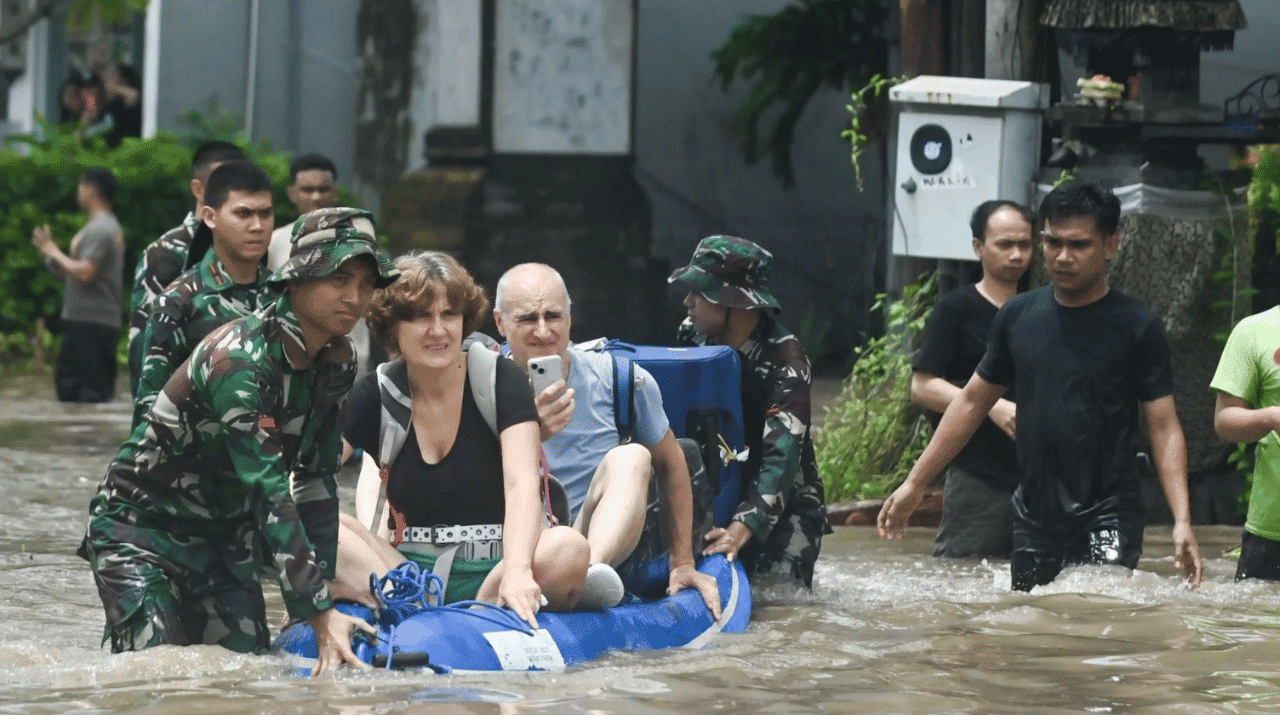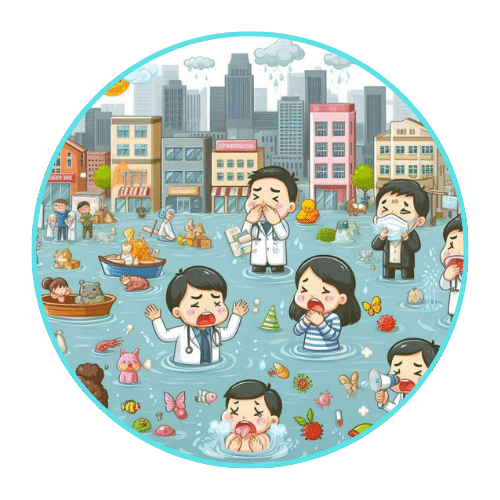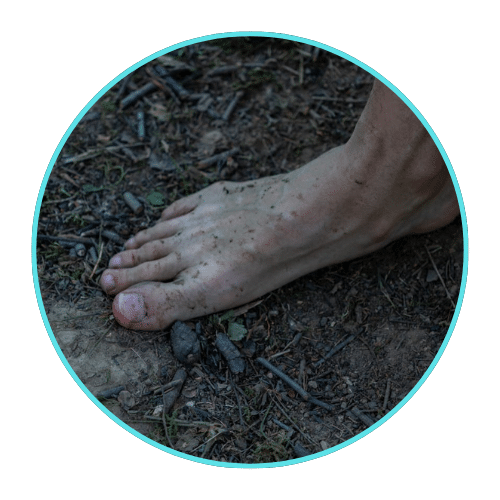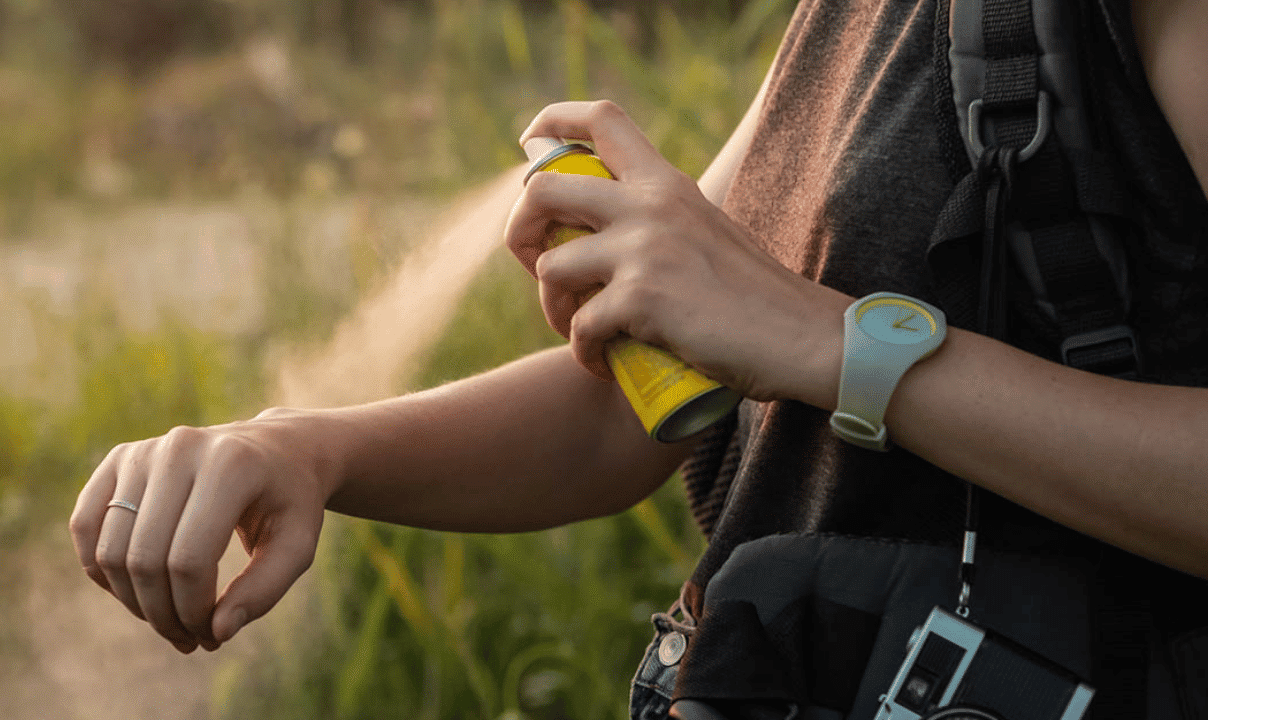
The Bali Flood in September 2025 has not only disrupted infrastructure but also posed long-term health challenges. Torrential rains led to flash floods and landslides across several regions, including Denpasar, Gianyar, Badung, Jembrana, Tabanan and others. Rivers overflowed, roads were blocked, many homes and infrastructure were damaged, and a large number of people were evacuated to temporary shelters.
While immediate rescue and relief efforts have been crucial, the aftermath of the Bali Flood brings serious health risks that often are less visible but just as threatening. Disasters involving floods tend to raise the chances of infectious disease outbreaks, injuries, and deteriorations in public and personal hygiene.
Below are some of the key disease risks after floods, examples of what can happen in Bali’s situation, and how clinics like Saline Clinic Bali can play an important role in prevention, treatment, and recovery.
Major Disease Risks Following Floods
Floods are not only natural disasters that damage homes, infrastructure, and livelihoods; they also create an environment where disease can spread quickly. When heavy rains and overflowing rivers mix with sewage, waste, and stagnant pools of water, the health risks multiply. After the Bali Flood, these dangers are especially concerning because communities may be displaced, clean water sources compromised, and medical resources stretched thin. Understanding the major disease risks following floods is critical for both prevention and timely treatment. In the aftermath of the Bali Flood, waterborne illnesses remain one of the top concerns.

Waterborne and Sanitation-Related Illnesses (e.g. Diarrhea, Cholera, Typhoid)
One of the most immediate threats after flooding is the contamination of drinking water. Floodwaters often carry sewage, chemicals, and industrial waste, overwhelming sanitation systems. When clean water supplies are compromised, bacteria such as E. coli, Salmonella, and Vibrio can easily spread, leading to severe gastrointestinal diseases.
Outbreaks of diarrhea, cholera, and typhoid are common in flood-affected areas, especially in temporary shelters where thousands of people may live in crowded conditions. Inadequate access to safe water for drinking, cooking, or washing hands makes it even easier for these illnesses to spread. For vulnerable groups such as children and the elderly, these infections can be life-threatening due to rapid dehydration and weakened immunity. Ensuring safe drinking water and proper sanitation is therefore one of the first lines of defense after a flood.
Vector-borne Diseases (e.g. Dengue Fever, Malaria)
Mosquito populations surge rapidly after the Bali Flood, increasing the risk of dengue fever. When the floodwaters begin to recede, another danger emerges: stagnant water left behind in puddles, containers, and drainage systems becomes a perfect breeding ground for mosquitoes. In tropical regions like Bali, this creates a surge in mosquito-borne illnesses such as dengue fever. The weeks immediately following a flood often see an increase in cases, as mosquito populations grow.
The humid and warm climate of Bali further accelerates mosquito breeding, while disrupted mosquito control programs during disasters make the problem harder to contain. Dengue fever, in particular, is a recurring threat in Indonesia, and outbreaks tend to worsen after major floods. Symptoms such as high fever, rashes, and severe joint pain can progress quickly without medical supervision. Clinics like Saline Clinic Bali play an important role in monitoring dengue cases, offering lab testing, hydration therapy, and vaccination services to help prevent serious complications.
Wound-related Infections and Tetanus
Floodwaters carry hidden dangers: sharp debris, broken glass, and contaminated mud can cause injuries during evacuation or cleanup. Even small cuts or puncture wounds become dangerous when exposed to floodwater mixed with sewage, chemicals, or soil bacteria. Without immediate care, wounds can quickly become infected, leading to serious health complications. Cleanup activities following the Bali Flood often expose people to sharp debris and contaminated mud.
Tetanus is of particular concern in these conditions. The bacteria responsible for tetanus thrive in dirty, oxygen-poor environments like contaminated wounds. In Indonesia, tetanus outbreaks have been recorded after natural disasters, especially when victims lacked up-to-date vaccinations. Symptoms such as muscle stiffness and spasms can be life-threatening without urgent medical care. Clinics like Saline Clinic Bali provide wound cleaning, prophylactic care, and tetanus vaccination to reduce this risk, making early intervention critical.

Other Risks
Beyond gastrointestinal, mosquito-borne, and wound-related diseases, floods also contribute to a range of other health issues. Overcrowded shelters with poor ventilation create conditions where respiratory infections such as Influenza, Tuberculosis and Pneumonia spread easily. Damp, waterlogged homes are also breeding grounds for mold, which can trigger asthma and other respiratory problems.
Skin and soft tissue infections are another common aftermath of floods. Prolonged contact with muddy or contaminated water can cause rashes, fungal infections, and cellulitis. These conditions, while sometimes overlooked, can escalate if untreated, particularly among children who are more likely to play in standing water. Addressing these “secondary” health risks is an essential part of post-flood recovery and requires both public health measures and individual awareness.
How Saline Clinic Bali Can Help

After the Bali Flood, medical facilities become a lifeline for affected communities. Medical services after the Bali Flood are critical, and Saline Clinic Bali provides essential care. From preventive care to specialized treatments, the clinic supports both locals and visitors in navigating the health challenges that arise in the aftermath of a disaster.
Vaccination Services
Vaccinations are one of the most effective ways to prevent disease after a flood. Saline Clinic Bali offers essential vaccines, including the tetanus vaccine for those exposed to injuries during flood cleanup and the dengue vaccine for individuals at risk of mosquito-borne infections. Ensuring that people are up to date with their tetanus shots is critical, since even minor wounds can become life-threatening if infected.
For dengue, the vaccine can help prevent the illness or reduce the severity of future infections. This is especially important in Bali, where dengue outbreaks are frequent and worsened by post-flood standing water. By offering these vaccines, Saline Clinic Bali plays a proactive role in keeping the community safe and reducing the likelihood of large-scale disease outbreaks.
Treatment and Care Programs
When preventive measures are not enough, access to timely medical treatment becomes crucial. Saline Clinic Bali provides specialized care packages for common post-flood illnesses, including Bali Belly Care for gastrointestinal infections and Dengue Fever Care programs for patients showing early symptoms of dengue. These services include doctor consultations, IV hydration, medication, and continuous monitoring.
In addition, the clinic supports patients suffering from dehydration due to diarrhea or fever—conditions that can become critical if left untreated. Having immediate access to professional care not only shortens recovery times but also helps prevent complications that often arise when illnesses are ignored or self-treated.

Laboratory and Diagnostic Services
Flood-related illnesses often present with overlapping symptoms such as fever, nausea, or weakness, making accurate diagnosis essential. Saline Clinic Bali’s in-house laboratory services allow for blood tests, stool analysis, and other diagnostic procedures that help identify the exact cause of infection. Early and accurate detection ensures that patients receive the right treatment instead of relying on guesswork.
This is particularly important for dengue fever, where early detection can prevent severe cases from developing. Similarly, laboratory services help distinguish between bacterial and viral infections in cases of diarrhea, guiding doctors to prescribe the most effective therapy.
Wound Care and Prophylaxis
In the days following a flood, many people are injured by hidden debris or sharp objects in the water. Proper wound care is essential to prevent bacterial infections and tetanus. Saline Clinic Bali provides wound cleaning, disinfection, and follow-up care to ensure that even small cuts are managed safely. For deeper or contaminated wounds, the clinic also offers tetanus booster shots as a preventive measure.
This service is especially important for residents and volunteers who engage in cleanup efforts, as they are often at higher risk of sustaining injuries. By addressing wounds quickly, Saline Clinic Bali helps reduce the risk of severe complications and contributes to safer recovery efforts across affected areas.
Preventive Health Education
Medical treatment is vital, but prevention is equally important. Saline Clinic Bali actively promotes health education to reduce the spread of disease after floods. The clinic provides guidance on essential practices such as boiling or filtering drinking water, proper handwashing, eliminating mosquito breeding grounds, and using protective gear during cleanup.
By educating patients and communities, the clinic empowers individuals to take control of their health and reduce their vulnerability to flood-related illnesses. This combination of treatment and education ensures that people are not only healed from immediate health issues but also better prepared for the weeks and months following the flood.
The Bali Flood has left behind more than damaged homes and roads—it has created conditions ripe for outbreaks of diarrhea, dengue fever, tetanus, and other health concerns. Quick and effective medical care is essential in reducing the human toll of such disasters. These educational efforts are vital in reducing the long-term health risks associated with the Bali Flood.
What Individuals and Communities Should Do Right Now

In the aftermath of the Bali Flood, prevention is just as important as treatment. While medical clinics like Saline Clinic Bali provide essential care, individuals and communities must also take active steps to reduce their health risks. By practicing safe habits and responding quickly to warning signs, the spread of disease can be minimized. Below are key actions everyone should follow to protect themselves and those around them.
Drink Only Safe Water
Always ensure your drinking water is boiled, filtered, or sourced from a trusted supply. Floodwaters often carry sewage, waste, and harmful bacteria, making them unsafe for cooking or drinking. Even when the water looks clean, it may still be contaminated with invisible pathogens. Using safe water for drinking, brushing teeth, and preparing food is the most effective way to avoid diarrhea and other waterborne illnesses.
Wash Hands Frequently
Good hygiene can significantly reduce the risk of infection. After contact with floodwater, mud, or shared surfaces in shelters, wash your hands thoroughly with soap and clean water. Handwashing is especially important before eating or preparing food. If soap and water are unavailable, use hand sanitizer with at least 60% alcohol. This simple habit prevents the spread of bacteria and viruses that cause diarrhea, typhoid, and other infectious diseases.
Prevent Mosquito Breeding
Mosquitoes breed quickly in stagnant water left behind by floods. To reduce the risk of dengue fever and malaria, discard or cover containers such as buckets, tires, or discarded bottles that can collect rainwater. Communities can also organize cleanup efforts to clear clogged drains and puddles. By eliminating mosquito breeding sites, the chances of an outbreak can be significantly reduced.

Use Mosquito Protection
Along with reducing breeding sites, individuals should take steps to protect themselves from mosquito bites. Use mosquito repellents, sleep under mosquito nets, and wear long-sleeved clothing, especially during the early morning and late afternoon when mosquitoes are most active. These simple precautions help lower the risk of dengue infection, which often increases after floods.
Inspect and Protect Wounds
Flood cleanup often leads to cuts and scrapes from debris or sharp objects hidden in the water. Even small wounds can become dangerous if exposed to contaminated mud or sewage. Clean all wounds immediately, cover them with waterproof bandages, and monitor for signs of infection such as redness, swelling, or pus. If the wound is deep or contaminated, seek medical care immediately and make sure your tetanus vaccination is up to date. Clinics like Saline Clinic Bali can provide wound care and booster shots to prevent tetanus.

Seek Medical Help Early
Do not ignore warning signs of illness. If you experience symptoms such as fever, rashes, joint pain, diarrhea, or persistent vomiting, consult a doctor as soon as possible. Early diagnosis and treatment are critical in preventing severe complications, especially with diseases like dengue fever and typhoid. Saline Clinic Bali offers laboratory testing and tailored care packages to help detect and treat these illnesses quickly and effectively.
The Bali Flood has brought with it not only damage to property and infrastructure, but also risks of disease that can follow flooding—dengue fever, diarrheal illnesses, tetanus, among others. While authorities and relief agencies work on restoring services, individuals also need to be mindful of preventive measures.
Saline Clinic Bali stands as a trusted healthcare provider during these challenging times. With vaccination programs, specialized care packages, laboratory services, wound management, and preventive health education, the clinic plays a vital role in helping both locals and visitors recover safely. By addressing not only immediate illnesses but also long-term risks, Saline Clinic Bali supports the island’s resilience and helps communities return to health after the flood. By addressing health risks caused by the Bali Flood, clinics like Saline Clinic Bali ensure community resilience.
What are the most common diseases after the Bali Flood?
The most common diseases include diarrhea, typhoid, dengue fever, and tetanus. Floodwaters often contaminate drinking water and create mosquito breeding grounds, increasing the risk of these illnesses.
Why is dengue fever a concern after the Bali Flood?
After floods, stagnant water becomes a breeding ground for mosquitoes. This leads to a rise in dengue cases, especially in Bali’s tropical climate. Dengue symptoms such as fever, rash, and joint pain should be checked by a doctor immediately.
How can I prevent diarrhea and waterborne diseases after the Bali Flood?
Drink only boiled or filtered water, wash hands frequently, and avoid using floodwater for cooking or bathing. If you experience diarrhea or vomiting, seek medical care quickly to prevent dehydration.
Is tetanus a risk during flood cleanup in Bali?
Yes. Cuts and wounds exposed to contaminated floodwater can become infected with tetanus. Getting a tetanus booster and proper wound care at clinics like Saline Clinic Bali is the best protection.
How does Saline Clinic Bali help after the Bali Flood?
Saline Clinic Bali offers vaccines for tetanus and dengue, wound care, hydration therapy for diarrhea, dengue fever management, lab testing, and health education to help communities stay safe after the flood.
